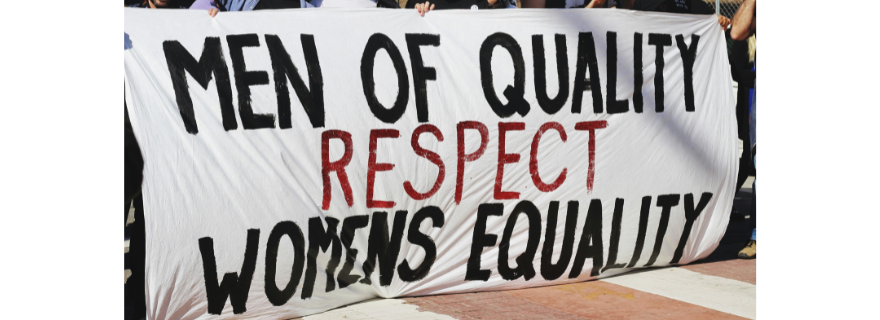Progressive men, watch out for your own underlying biases!
Progressive men can play a crucial role in promoting gender equality and psychological safety. But to do so effectively, they must also face up to their own subtle biases.
Recently, I (senior man) sat on an application committee for a PhD position, together with a junior man and two junior women. Just before the first candidate arrived, we noticed that the two men on the committee were sitting in the middle. As social psychologists we knew that objects in the middle attract attention and are seen as more important. Men at centre stage... we realised, just in time, that this is not the image we want to portray as a modern university. I was happy to sit to the side for the rest of the day.
I was reminded of this when I saw the report “nothing seen, nothing heard, nothing done” about the toxic work environment at the Dutch public broadcasting service NPO. Sexist behaviour and other instances of misconduct were revealed to be widespread and anchored in a masculine culture with high work pressure and strong competition.
One of the important insights in the report is the role of precisely this broader culture and the subtle behaviours it elicits. Looking away is less visible than blatant misconduct, but it still facilitates more extreme behaviours, in this way perpetuating them.
In this context it is also important to note that a toxic culture can, to some extent, be kept in place by respectful, empathetic, and progressive individuals. They too can fall prey to implicit stereotypes, expectations, and norms. You don't have to be sexist to behave in a sexist way.
When it comes to tackling workplace toxicity it would then perhaps seem obvious to focus on this culture. However, ironically, that is not the typical approach. Instead, the focus tends to be on the ‘bad apples’ and juicy details. We mainly see the other, paying less attention to ourselves, and almost none to something like 'culture'.
A painful illustration of this is the contrast between written and oral responses from organisations involved. After incidents at Ajax football club and The Voice of Holland reality show, press releases expressed empathy with victims and the importance of a safe workplace. But these written statements then contrasted sharply with oral responses showing discomfort and awkwardness, for example from a evasive Edwin van der Sar or a somewhat apathetic John de Mol.
Importantly, this does not mean that these men do not subscribe to the progressive values of their organisations. Rather, what their reactions seem to suggest is that in a competitive, masculine culture it is difficult to switch to a more authentic and spontaneously progressive voice.
Implicit engagement
These observations fit seamlessly with the psychological research in our lab, where we measure opinions using questionnaires but also biological markers of implicit motivation. For example, we use electrodes to measure the speed and force with which someone’s heart is pumping. By combining different measurements, we gain insight into implicit engagement, for example when someone is voicing their opinion on a certain matter.
What our research shows is that a progressive opinion regarding gender equality in a questionnaire, for example, does not always go hand in hand with high implicit engagement with the topic. And it is especially among men (even those who aspire to be progressive) that this gap emerges.
For example, in our research with visitors to the Lowlands festival, we presented men and women with progressive or conservative statements such as “feminism discriminates against men”. In a questionnaire, Lowlands visitors appeared to be very progressive: They strongly agreed with the progressive statements and disagreed with the conservative statements. And importantly, there were no differences between men and women: they were both equally progressive.
In a next stage of the experiment, the participants debated the statements. Participants were randomly allocated to defend either the progressive or the conservative position. During the debates, we measured biological indicators of implicit engagement, which showed differences between men and women: Women's hearts beat just a bit more strongly for gender equality than men’s.
More specifically, for women the biological markers of implicit engagement were in line with their opinions in the questionnaire: They showed strong engagement when they had to defend the progressive position, and weak engagement when they had to defend the conservative position. Men, however, displayed exactly the opposite pattern: When defending the progressive position they were not just less engaged than women were, but also less engaged than men defending conservative positions.
In other words, men’s heads said something different than their hearts: They were progressive on the questionnaire, but when offered the possibility to express this attitude, they seemed less engaged than you might expect.
Perhaps even more shocking are related observations in the prize-winning thesis research by Linda Bomm on responses to accounts of female rape victims. These responses were compared to responses to an account by a female victim of a bicycle accident caused by a man.
In a questionnaire, student participants (again rather progressive) showed strong empathy with the rape victim: She was believed and ascribed little responsibility for the situation. However, these empathetic responses were still slightly stronger among female participants than among males, and it was striking that highly (cis) gender-identified men, in particular, believed the victim a bit less and blamed her a bit more.
Biological measurements were consistent with this: Highly gender-identified men displayed less implicit engagement when responding to the rape account than weakly gender-identified men, and there was less difference in their engagement when responding to the account of the bicycle accident.
Consequences for interventions
The fact that progressive people can still fall prey to a bias between their progressive opinions (even if these are sincerely held) and implicit engagement with gender equality has important consequences for interventions. First, it shows that focusing on good intentions is not enough to actually change things. Second, the effects of masculine identity underline the importance of culture, as gender identity is not just an individual trait but is strongly influenced by cultural factors, such as a masculine work environment.
But what can we do where misconduct is facilitated by a relatively invisible culture, to which even people with the best intentions fall prey? First, to tackle inequality (such as gender inequality), we should not focus only on good intentions, but also on concrete outcomes, for example by applying quotas. Quotas are a clumsy remedy, but sometimes they are needed to set change into motion.
Second, it would be good for men (even progressive ones) to look in the mirror every now and then and ask "What have I done lately to further equality and psychological safety?" Progressive men can take the lead in promoting change, but for this their implicit engagement should become more on a par with their explicit attitude. Importantly, however, this does not necessarily require grand gestures: even a subtle step away from centre stage can be a start.
This blog is an adaptation of an opinion piece in Trouw on February 17th 2024.
Banner: Samantha Sophia (Unsplash)





